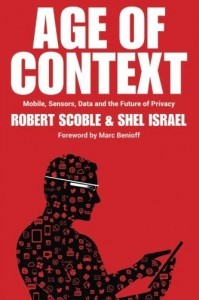 Imagine pulling into a big-box hardware store on the weekend. The store knows who you are before you walk in, knows you’re a homeowner and that you’re likely building a deck. Attendants are already gathering the lumber you might want, and an internal map of the store with all the supplies you need pops up on your phone. When you pick up some stain, an iPad near the display offers a special price and notes that you haven’t yet picked up any nails, which are in the next aisle.
Imagine pulling into a big-box hardware store on the weekend. The store knows who you are before you walk in, knows you’re a homeowner and that you’re likely building a deck. Attendants are already gathering the lumber you might want, and an internal map of the store with all the supplies you need pops up on your phone. When you pick up some stain, an iPad near the display offers a special price and notes that you haven’t yet picked up any nails, which are in the next aisle.
Depending on your views on privacy, such a shopping experience might sound like an incredible modern convenience or a dystopian world of corporate surveillance. But in either case, the technology to make it all happen is emerging, as described by authors Robert Scoble and Shel Israel in their book, “Age of Context: Mobile, Sensors Data and the Future of Privacy.”
Israel will deliver a talk on the “Age of Context” at the Central Coast MIT Eneterprise Forum at 5 p.m. on Wednesday, June 18 at the Cabrillo Pavilion Arts Center in Santa Barbara.
Scoble and Israel detail the convergence of five forces: social media, mobile computing, data, sensors and location. Those technologies combine to give technology companies a picture of who you are, where you are, what you’re doing and what your preferences are with a degree of accuracy previously unimaginable.
Mobile phones can interact with sensors placed in stores to see how you shop. Sensors in cars can help them drive more safely than humans ever could. Social media conversations reveal more about our likes and dislikes than surveys. Senors can be embedded in wrist bands or even digestible pills to help track and improve your health. Your mobile phone, ever present in daily life, keeps a detailed log of your whereabouts and activity, a rich but huge stream of data that can now be analyzed by powerful computing clouds at low cost.
In their book, Scoble and Israel find dozens of Silicon Valley companies tapping those newfound powers to make the world a better place, whether it be through helping people lose weight, helping prevent car crashes or simply making a shopping trip or hotel stay a more friendly and personalized experience, the way mom-and-pop shops of yore used to feel. But cool as the capabilities are, even a pair of authors who write about technology for a living couldn’t ignore the implications for personal privacy.
“For Robert and I, privacy was the elephant in the book,” Israel told the Business Times. “We didn’t want to write a book that had anything to do with privacy, but every chapter, every piece of technology, every company we discovered, we realized that good people, family people, were creating things that could be abused. They weren’t doing it because it could be abused. They were doing it because of the good it could do.”
And that good is real. Companies are already using wearable computers akin to Google Glass, with its heads-up display, to share expertise. One company that does mechanic work on exotic and expensive cars uses such a system so that a remote expert can “see” what a mechanic sees to help him diagnose and fix a problem with a car much faster. In other countries, doctors are using similar systems so that when a patient is in dire need of emergency surgery but no specialist is available, an expert can walk the on-site doctor through the procedure as a last resort. “That is being tried out. The U.S., of course, won’t allow it to be tried here, but it’s being done in Korea right now,” Israel said.
But context can also be simpler, such as using a mobile phone to look up “park Santa Barbara” while driving. If the phone’s GPS sees that you’re on a road on driving speeds, it “somehow knows that we’re looking for a place to put our car and not for a place for our children to play. Are we going to stop using Google because I don’t want them to know that I’m going to park my car?”
Israel said that the book he co-authored barely scratches the surface about privacy issues and that there’s a “huge gap” between how average consumers think about privacy and how technology companies do. “There’s no legal case, there’s no precedent on who owns our data,” Israel said.
Israel said transparency about what’s being collected and what’s being done with it and a universal opt-out feature will go a long way. The duo also coins the term “Las Vegas mode” for mobile and wearable computers, saying devices should have a mode where they can be disabled from tracking.
But Israel is confident that consumers will eventually be willing to trade some privacy for the conveniences that context provides. Trust will become the new currency of business, the authors argue. It’s an uphill battle for businesses, because consumers are already disinclined to trust brands and marketing messages. But it’s a battle that has to be won for a business to be successful.
“I do believe that in the Age of Context, we’re going to do business with the companies we trust, and when one has a feature that the other doesn’t have, we’re going to jump like some fickle teenager from one company to another,” Israel said.
The cost of the event is $35, and admission includes a free copy of “Age of Context.” Click here for more information.
[Full Disclosure: The Business Times is a media sponsor of the Central Coast MIT Enterprise Forum.]






 Print
Print Email
Email

















